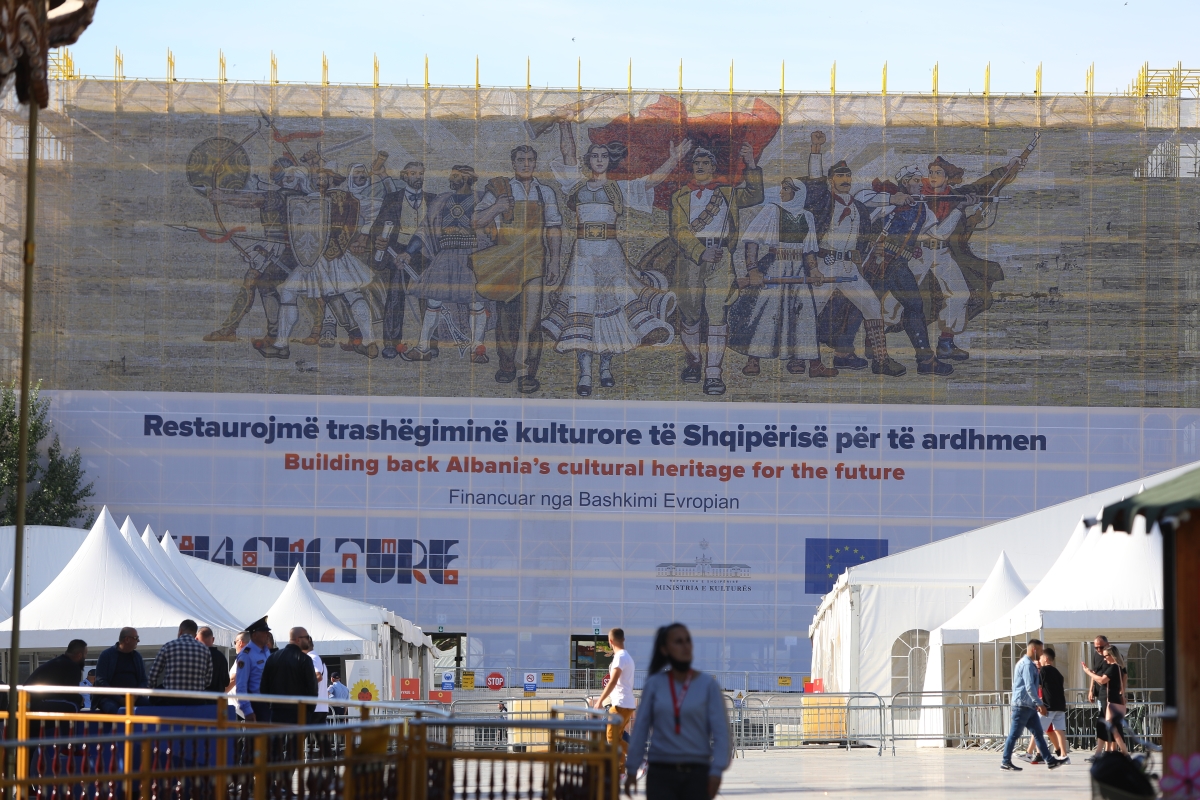9 July 2021 – EU4Culture Programme

Tirana, 9 July 2021
The EU4Culture Programme is funded by the European Union and implemented by UNOPS in close partnership with the Ministry of Culture, with a total budget of € 40 million. Its goal is to restore cultural heritage sites damaged by the 2019 earthquake. In addition to the restoration, the project will invest in the site’s revitalisation, which will contribute to Albania’s socio-economic recovery by improving its tourism potential. It will also support local communities with grants, will bring in international and EU standards and expertise and will provide technical support to Albanian institutions.
EU4Culture will also strengthen Albania’s efforts towards the achievement of a number of Sustainable Development Goals (SDGs) including SDG 8 (economic growth), SDG 9 (infrastructure and industry), SDG 11 (urban and rural development) and SDG 17 (revitalised global partnership), as well as relevant EU policies in the cultural heritage sector, including EU Framework for Cultural Heritage.
The stakeholder discussion with field professionals organised on 9 July 2021 in view of conservation and revitalisation proposals of interventions for 6 cultural heritage sites: Ethnographic Museum in Kruja, Venetian Tower and Hamam in Durres, Ethnographic Museum in Kavaja, National Puppet Theater and Kurcaj Bridge.
Project stakeholders and cultural heritage experts of different profiles were invited to share views and discuss proposed interventions. The proposed conservation and revitalisation measures for the sites in question aims at the overall improvement of condition and resilience of historical buildings and sites in terms of risk and disaster preparedness. Sustainable and responsible usage of cultural heritage assets leads to better preservation and it can become a source of inspiration and cultural creation for members of local communities, artisans, artists, craftspersons and everyone who wants to get engaged.
During her speech, the Minister of Culture, Ms. Elva Margariti stated:
“It is true that this fund was allocated under extraordinary circumstances, but this abnormal situation we had the task not only to return it to normal, but to create an opportunity in order to revitalize not only the structures, but also the entire surrounding area of monuments included in the priority list of EU4Culture Program. But what do we mean when talking about revitalisation? Revitalisation does not mean only reconstruction of walls but restoring them.
It means transforming these objects into cultural and tourist attractions, by seeking help from technology, the contemporary museum approach, which has the power to speak to everyone in the language of time, which fascinates young people with their imagination and creativity; that captures children’s attention to better know their country. But above all, it means creating a key for sustainable economic development for local communities.”
During the Stakeholder Meeting UNOPS Country Manager, Ms Pamela Lama and other UNOPS team members shared the proposed site’s interventions. Ms Lama stated that all project sites will undergo several intervention phases, starting from the restoration and conservation of the fabric, interpretation, cultural heritage management and business planning and disaster risk management. “In close partnership with the Ministry of Culture, we shall be working to develop new models of sustainable and responsible heritage utilization which is contributing towards local and national economic development.”
The EU Delegation representatives Mr. Andrea Marco Vera underlined that “EU4Culture in one of the largest ever cultural heritage programmes designed by the European Union in terms of number of monuments and funds involved. EU4Culture will help improve the enhancement and attractiveness of these sites, and will be very inclusive with the Albanian cultural heritage community-historians, archeologists or architects of invaluable knowledge.
rea Marco Vera underlined that “EU4Culture in one of the largest ever cultural heritage programmes designed by the European Union in terms of number of monuments and funds involved. EU4Culture will help improve the enhancement and attractiveness of these sites, and will be very inclusive with the Albanian cultural heritage community-historians, archeologists or architects of invaluable knowledge.



